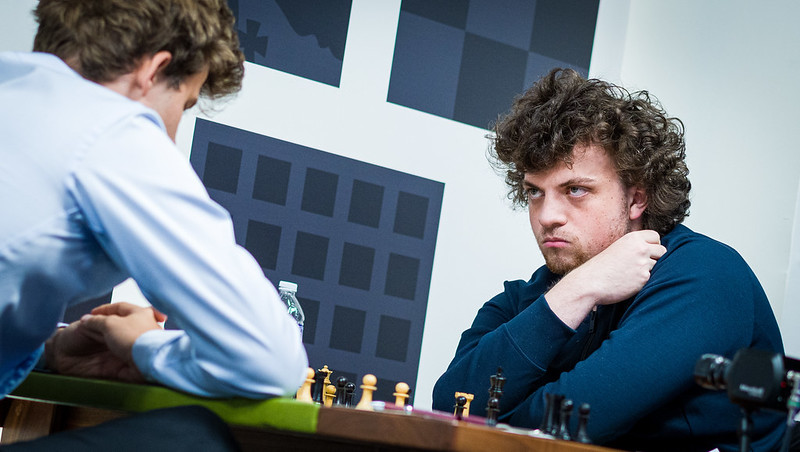Chess cheating claims lack support
Magnus Carlsen must provide evidence to support his accusations or apologize to Hans Neimann
Hans Niemann (right) defeats Magnus Carlsen (left) in a chess match.
October 3, 2022
If you haven’t been keeping up with the latest drama in the chess world, here’s all you need to know. In the third round of the Sinquefield Cup, Hans Neimann defeated reigning world champion, Magnus Carlsen, with the black pieces — an incredibly impressive feat for Grandmaster Neimann, who wasn’t even rated 2700 before the match, compared to Carlsen’s 2864. After the match, GM Carlsen withdrew from the tournament and insinuated on Twitter that this was due to foul play on the part of Neimann. Later in the week, in a post-match interview, Neimann admitted that he had cheated in online matches on Chess.com when he was 12 and 16 years old but has never cheated in over-the-board chess.
This sent the chess community into uproarious pandemonium, with many quickly choosing sides to defend or attack Neimann vehemently. This chaos only intensified when Neimann and Carlsen met again in the Meltwater Champions Chess Tour on Sept. 19 and Carlsen resigned after only two moves. This decision not only clarified any confusion regarding the situation, but it put the entire chess community on alert for some update from Carlsen.
But this was not to be the case. Carlsen has still not come forth with any specific allegations, let alone any proof of Neimann cheating in any over-the-board match. Carlsen is undoubtedly one of, if not the greatest chess player of all time and his unsubstantiated accusations only hold weight because of his status. What we are seeing here from Carlsen is an irresponsible and toxic abuse of prestige in an otherwise unproblematic and harmonious community.
[Carlsen’s] statement makes me question why [he] does not, instead of refusing to play Niemann, do his best to play the top moves in each position and force Niemann to play like an engine to defeat him.
It is worthwhile to look at this recent episode in the context of greater chess history, in which Americans have always been looked down upon by their European counterparts. This goes back to the American legend Paul Charles Morphy, who crossed the Atlantic in 1858 and obliterated every European chess master who would face him. Unfortunately, Howard Staunton, the European champion at the time, refused to play him, and thus Morphy cannot be officially acknowledged as a World Chess champion.
Then, in the late 1960s and early 70s, another young, charismatic American broke on to the chess scene — Robert Fischer. Fischer received a great deal of criticism from the chess community because of his eccentric behavior both in and out of the playing halls. This tension was made all the more potent by the hostile relations between the United States and the Soviet Union — which had dominated the game of chess for the better part of the twentieth century — and Fischer was held up as the product of American democracy and individualism in contrast to the cold, suffocating play-style of the Soviets. While Fischer was able to earn the title of World Chess Champion in 1972 after winning “The Match of the Century”, he did not defend his title because of various issues unrelated to chess — mainly, they wouldn’t pay him enough money to compete.
I see something similar happening with Neimann, who has faced the most scrutiny not from fans, but from fellow Grandmasters. GM Ian Nepomniatichi’s facetious remarks in a post-game interview from the Sinquefield cup and GM Hikaru Nakamura’s initial reaction to the scandal especially stand out to me. While it is uncommon for a young player — Neimann is only 19 years old — to rise in rating so quickly, it isn’t impossible or even improbable. While most Grandmasters were cocooned in their homes, playing bullet chess on the computer, Neimann was traveling all across Europe, focusing on classical, over-the-board chess.
I cannot deny that Neimann may be somehow cheating — we cannot prove a negative — and if that is the case, it will be a devastating blow to the chess community. But, as of right now, all that we have to go on is the suspicions of one man, albeit the World Chess Champion. It is fair to be equally suspicious as Carlsen and to feel a sense of instability in professional chess, but what cannot be determined is anything concrete.
This is why it is so important for Carlsen to release an official statement of some kind, or provide the proof he affects to possess. What Carlsen has done is recklessly engender a witch-hunt targeting a young chess player with a potentially bright future. In short, Carlsen is punching down without even throwing a punch. Derailing an unestablished player’s career and enshrouding it in controversy sets a scary precedent for chess, one in which the sport only becomes more elitist and less about an inspiring mix of intellect, magic and strength.
Note: Since the writing of this article, Carlsen released a statement on Twitter regarding the drama: “I believe that Niemann has cheated more – and more recently – than he has publicly admitted. “[Niemann’s] over-the-board progress has been unusual, and throughout our game in the Sinquefield Cup, I had the impression that he wasn’t tense or even fully concentrating on the game in critical positions, while outplaying me as black in a way I think only a handful of players can do.”
While this is an important step toward resolving the issue, Carlsen still lacks anything concrete. His statement makes me question why Carlsen does not, instead of refusing to play Niemann, do his best to play the top moves in each position and force Niemann to play like an engine to defeat him.























